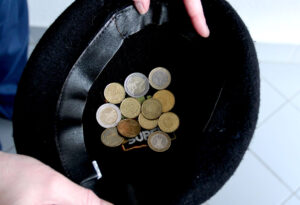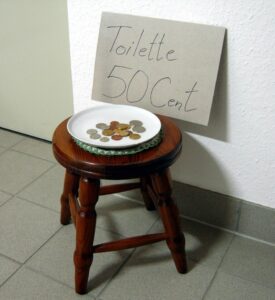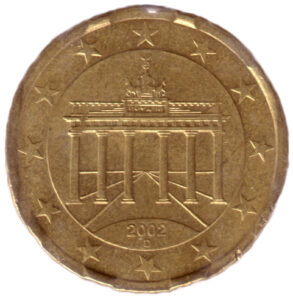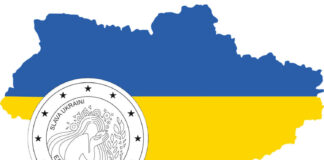Even if you keep looking and search the wallets of family members and friends for foreign euro and cent coins on a daily basis – at some point you reach the limits of what is possible. And then? Well, even if Covid-19 is currently ruining our travel plans, there are still enough sources that can be exploited in order to find missing pieces for your collection. In the following article, I would like to show you which resources you can make use of with little contact and, of course, keeping the required minimum distance. First of all, you need some time to think. If we want to go on an exciting euro coin treasure hunt, we should know our surroundings and analyse them in advance.
Airports, Train Stations and Kiosks Are Gold Mines
Airports, train stations and kiosks are definitely the right place. Most shops there are often the first stop for arriving travellers to spend their money. I usually have a coffee and try to start a conversation with the shop assistant. That’s not always easy, but definitely worth a try. Do it in the evening when things are a little more calm. The people behind the coffee machines are less busy then and often grateful for any kind of distraction. I always tell people straight away that I’m a coin collector and looking for certain pieces. That usually arouses a lot of interest. Apparently, everyone gets curious when it comes to money. Then I can easily explain what I’m looking for and when the waitress behind the counter starts looking for foreign euro coins in the cash box, we almost reached our goal. This person has also become curious and is eager to see what treasures might be hidden in the change. If you are then immediately able to identify every foreign coin they hold up, they will usually be incredibly amazed. Knowledge is everything. And if you visit the shop more often, you will soon become an old acquaintance. It already happened to me that, when visiting one of these shops, someone put a handful of coins on the counter and said “Here, I’ve kept these for you, are there any interesting pieces among them?” Great! I always exchange such coins at a rate of 1:1, and if there is something “special”, I give a generous tip. Such things also work wearing a mask, so don’t be shy.
Interesting: Revolving Stars on Euro Coins
To arouse interest, you should tell them exactly what you are looking for. For me, it always worked to talk about euro coins with “revolving stars”. And if you then also explain that such pieces can be worth up to several thousands of euros, the ice is usually broken. All coins with revolving stars from the zero series were found in circulation money, as is well known, so why shouldn’t you be lucky for once?
Collection Tins in Pharmacies and Drugstores
Friendly asking for help in pharmacies and drugstores will also help you. After some time, you will get used to the often somewhat puzzled faces that you certainly encounter when you first explain what you’d like to do. Anything can become part of the routine. With a bit of luck, you will be allowed to search the collection tin for rare pieces or error coins. As a thank you, I always put one euro in the box. If I find some interesting pieces, I exchange them. Nevertheless, you should “put your cards on the table” and briefly explain what it is that you found. But that shouldn’t be a problem for collectors. Believe me or not, I found a 50 cent piece from the Vatican in a drugstore in our town in 2011. I had a similar experience with Latvian coins. I was able to exchange almost all eight circulation coins 1:1 when I found them in a donation box. Only the 1 and 2 euro pieces were missing, but the foundation stone had already been laid. When I visited the shop again, I found more pieces from Latvia and was able to replace two somewhat worn off coins of my collection. It doesn’t get any cheaper than that.

Exchanging Money in the Street
As I live near Berlin, I often use the underground or the train to get into the city. On the way, there are many stations with a lot of music. There are street musicians at almost every corner of Berlin and their music is often even quite good. However, I’m rather interested in the little donations that people throw into the opened violin case when they pass by. Here, too, numismatic treasures could be found. The musicians themselves are usually rather interested in the nominal value of the coins than in the great diversity of euro countries. And that’s the very starting point of our conversation when I politely ask them once they make a break. It is not uncommon for a long conversation to unfold and we talk about anything and everything. Here, too, I have my “regulars” who are actually worried about me when I haven’t been there for a while. By the way, musicians at Berlin stations have a licence to play music, and they have to pay regularly for it. As a thank you for their kindness to allow me to search for treasures in the money they earned, I obviously buy a coffee or a currywurst for them. After all, we are almost colleagues. Before Corona, he was a music teacher, played at the theatre and has been saving for a trip to Australia for a long time. I, on the other hand, am just a passionate collector thinking about how to best get hold of foreign euro coins at low cost. “Not bad either, at least you’re thinking about it”, my musician said, playing his guitar and harmonica for a change. A cowboy atmosphere at Alexanderplatz.

Don’t Be Afraid to Ask the Restroom Attendant
“Everybody needs to go to the toilet sometimes!” that’s a wisdom – that sounds far better in Berlin slang – shared on a toilet that is still run by people in the middle of Berlin. You want to know where it is? I won’t tell you! Because here you still pay with coins instead of feeding a vending machine. If need be, you can also have a button sewed back on or at least borrow needle and thread. The famous plate on a stool at the entrance could also be a little treasure trove. I like going there, even if I don’t need to go to the toilet. And you surely get a saucy Berlin saying there for free. The lady there knows me quite well and calls me “John Rockefeller”. Of course we chat and I find out the latest news from the “underground” (underground because the toilet is in the basement). “Sure, you can look at the money but don’t cheat on Elke, because the euro is doing quite well for a change.” So I take a seat and have a quick look at Elke’s “toilet coins”. Toilet Elke speaks almost all the time without taking a breath. “Don’t look like that, Mr Privy Councillor, the old man sitting there counting money is a member of the vice squad and controls my work here. Sure, little man, I also take dollars!” It’s often hilarious but it’s worth it in the end because a 20 and a 50 cent piece from Malta accompanies me later when I leave the underground and go back into the light of day. In the basement you can hear Elke swearing: “Damn kids, don’t you have a mother? Go to her!” I just love Berlin humour. Only the Saxons are even funnier!
Offers and Auctions Online
It is also worth looking around online and you find out a lot about current prices there. It will certainly happen that, even after all these efforts, you have to get hold of individual items by other means. Here, too, it costs nothing to ask. Once you have established contact with the seller, you can simply ask him if he could “by chance” add a mint state 2 euro coin of his country minted in year X to the items you ordered. Usually they are willing to do so – and you simply transfer 2 euros more to the seller. That shouldn’t be any problem at all. You may even start a coin friendship or help a collector to get hold of German euro coins.
Conclusion
What’s most important is the willingness to communicate, and we could really do more in this regard without infecting each other straight away. Always approach things with the motto “It doesn’t cost anything to ask”. Many will understand your intention or even ask interested questions about it. Communication is key, and don’t be afraid of foreign languages. There are excellent free translation programmes on the internet that you should definitely use. Have your questions translated into the respective national language and print it. This will certainly help you. Believe me, whether it be at fairs in the Czech Republic or in Italy, my printouts often helped me when I wasn’t able to ask the question in the national language. In the case of a written enquiry, such free online translation tools are of incredible worth. Just give it a try. Eventually, what’s important is that you reach your goal. And as an age-old saying goes: “All roads lead to Rome.”
After all, you cannot enjoy getting lucky as a collector without some proverbs of the collecting world. Think about later when you tell your grandchildren about how you got this or that piece. You can then say: “I took a few detours, yes, but I finally did it!”
Find out more about our author numiscontrol, alias Reiner Graff, in our who’s who.
Particularly popular are his articles “How the Prices of the First Vatican Euro Coins Changed Over Time” and “What Is My Euro Starter Kit from 2002 Worth Today?”.
The collecting expert made it his mission to introduce beginners to the world of coin collecting – here you can read the first article in his series “Coin Care in Simple Terms”.







